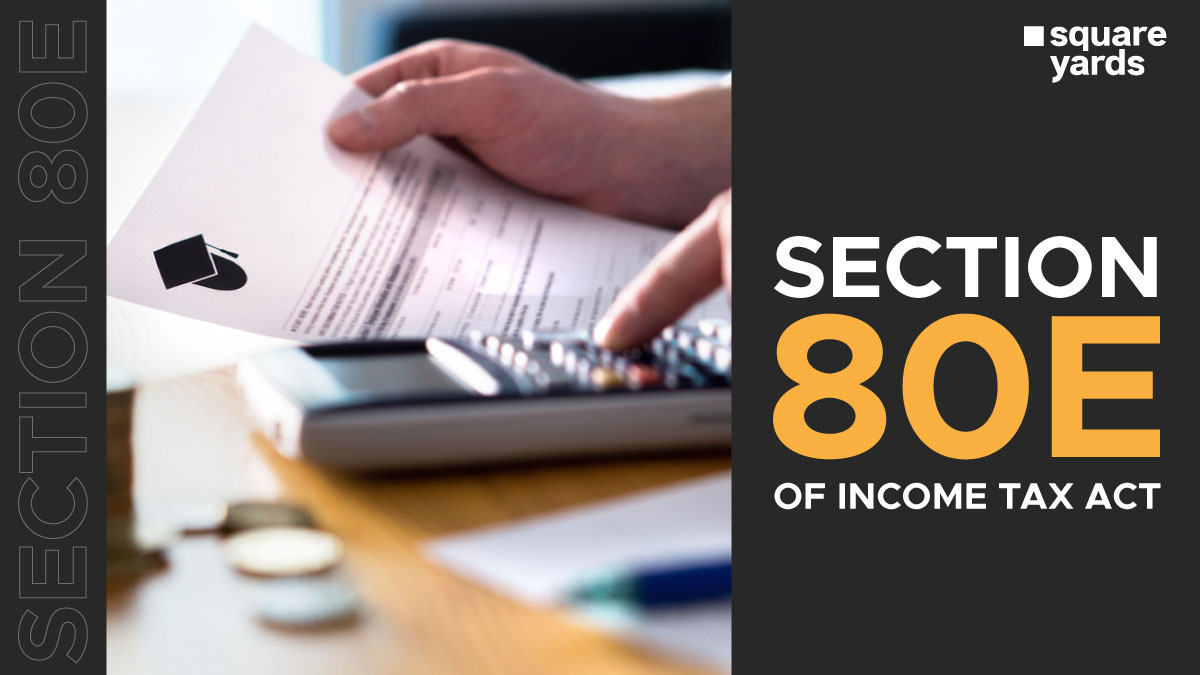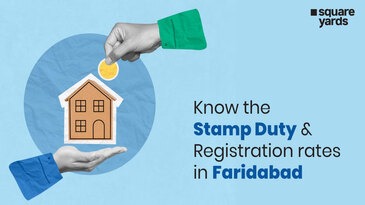India’s education industry is expected to reach $225 billion by the year 2025. Noticing the rapid growth, the government too is taking various measures to improve the quality of education in the country. Today, more parents than ever are willingly enrolling their kids into schools for quality education right from the primary stage. They are also taking higher education seriously and aren’t afraid to enrol their children even in international institutes. With the increasing number of enrollments, however, there is also a rise in the number of educational loans. And that brings us to our blog’s topic i.e. Section 80E of the Income Tax Act.
Scroll down to learn more about Section 8OE, its eligibility, documentation and deductions
Table of contents
- What Exactly is Section 80E of the Income Tax Act?
- Purpose of Educational Loan
- What is the Eligibility Criteria for Tax Deduction under Section 80E?
- Tax Benefits of Educational Loan Under Section 80E
- Necessary Documents for Claiming Section 80E Deduction
- Claiming 80E Tax Deductions
- Understanding Deductions Under Section 80E
- Frequently Asked Questions (FAQs)
What Exactly is Section 8OE of the Income Tax Act?
Section 80E specifies the provision for tax deductions on an education loan. This loan can be taken on behalf of your children, spouse, adopted children, or student for whom you (the taxpayer) are a legal guardian.
In simple words, any interest that the taxpayer pays towards the clearance of the educational loan is applicable for a deduction under Section 8OE.
The section further states that the individual has to take a loan from a charitable or financial institution. A charitable institution can be any authority mentioned under clause 23 C of Section 10. And a financial institution can be any bank that operates and offers services in accordance with the Banking Regulation Act, 1949.
Purpose of Educational Loan
The purpose of taking an educational loan should be for pursuing higher education. It doesn’t matter whether the loan is taken for studying in India or a foreign country.
What is the Eligibility Criteria for Tax Deduction under Section 8OE?
- The deduction under Section 80E of the Income Tax Act is only applicable to individuals. A HUF (Hindu Undivided Family), company or firm cannot claim this deduction. It can only be claimed by those individuals who have availed of an education loan and are liable for repaying it out of their income. Loans taken from relatives or friends are also not applicable for the 8OE deduction.
- You can only claim an income tax deduction on the interest component.
- The tax benefit can be claimed by both the parent as well as the child. This means that the person paying the educational loan, whether it is the child or the parent, is eligible to claim the deduction.
- One can avail of the deduction only if the loan taken is for financing higher education.
- An individual can avail of the deduction for only 8 years. The deduction cannot be claimed for more than 8 years.
- Only the person liable for paying taxes can avail of the deduction.
Tax Benefits of Educational Loan Under Section 8OE
As per Section 80E of the Income Tax Act, 1961, tax benefits can be availed by the individual who has applied for a loan for higher education. Even if the person has already availed the maximum deduction amount of ₹1,50,000 under Section 80C, he/she is still eligible to avail of deduction under Section 80E.
Most people tend to confuse Section 8OE with Section 8OC. It is essential to know that Section 80C specifies deductions based on the tuition fee paid for education. Section 8OE on the other hand specifies deduction based on the interest on loans taken for higher education.
Necessary Documents for Claiming Section 8OE Deduction
To claim an 80E deduction, the individual has to:
- Submit the certificate provided by the financial or charitable institution from where the loan is taken
- The submitted certificate should display the principal loan amount as well as the interest amount for the loan taken in that year.
- If you are a salaried employee, you can also submit your most recent bank statement to the employee for deduction in Form 16.
- Make sure you keep a scanned copy or printout of the above-mentioned documents for availing of the education loan tax benefit.
Claiming 8OE Tax Deductions
The deduction under Section 80E of the Income Tax Act is only applicable to the interest paid on the loan taken for higher education. There is no upper limit on the amount and you can get the tax benefit on the full interest amount paid, but not on the principal amount. One can avail of deduction under Section 80E irrespective of the loan amount which can start from ₹1 lakh to 20 lakh or more.
Deductions under Section 80E are allowed only for loans taken for higher education. Higher education refers to studies after completion of SSE (Senior Secondary Examination). It comprises regular as well as vocational courses in India or outside India. Therefore, a loan taken for any of the post-graduation courses comes under Section 80E.
One can claim a deduction under Section 8OE of the Income Tax Act only after a year of starting to pay the interest on the loan. Those who start paying interest in the same year of loan borrowing can claim the deduction on the interest payment of the loan. The maximum time period permitted to claim the deduction is up to 8 years, starting from the year one starts to repay the interest on the loan or till the time interest is fully paid.
Understanding Deductions Under Section 8OE
Since there is no particular limit on the loan taken for higher education under section 80E, there is no effect on the tax benefit on the interest paid.
Take a look at the table below to understand how the deductions under Section 80E work. Remember, the amount can vary as per the individual’s income and other particulars.
| PARTICULARS | AMOUNT |
| Individual’s Income | ₹10 lakh |
| Interest repaid/80E deduction | ₹2 lakh and 50 thousand |
| Taxable Income | ₹7 lakh and 50 thousand |
As you can see, the interest repaid on the loan is deducted from the individual’s total income (₹10,00,000 – ₹ 2,50,000). The result, therefore, is ₹ 7,50,000 which means the income tax is also reduced. But to claim this benefit, the individual has to fulfil all the eligibility requirements under Section 80E.
Wrapping Up
We’ve covered all the available information on Section 80E of the Income Tax Act above. If you think you are eligible and aren’t sure how to claim tax deductions under this act, we suggest reaching out to an expert. In case of questions or concerns, take a look at the FAQ section below.
You May Also Read:
Frequently Asked Questions (FAQs)
Is Section 80E a part of Section 80C of the Income Tax Act?
No, Section 80E is not a part of Section 80C of the Income Tax Act. Both the sections come under the Income Tax Act but are different from one another. The major difference between Section 80E and Section 80C is that the former offers deductions on interest paid on the educational loans while the latter offers deductions on tuition fees.
Can one claim benefits under Section 80E if the loan is taken for higher education outside India?
Yes, it is possible to claim benefits under Section 80E even if the loan is taken for higher education in a country outside India.
Is there a limit to the highest deduction that one can claim?
No there is no limit on the highest deduction one can claim under Section 80E of the Income Tax Act.
Can a Hindu Undivided Family claim tax benefits under Income Tax Act, Section 80E?
No, Hindu Undivided Families can’t claim any tax benefits under this section.
Can a company or firm, claim tax benefits under Income Tax Act, Section 80E?
No, a firm or company can’t claim any tax benefits under Section 80E.
Can I receive an exemption on income tax against a home loan under section 80E?
No, getting income tax exemption against a home loan is not possible under Section 80E of the Income Tax Act. Only the applicants who have availed of a loan for higher education with proper proof can receive tax benefits under this section.
Is claiming a deduction for principal and interest amount of the EMI for an education loan possible under 80E?
No, claiming a deduction for the principal amount is not allowed under Section 80E. The deduction can only be claimed for the interest amount of the EMI.
Do I have to submit any sort of proof for tax deduction under Section 80E?
Yes, you will have to submit the certificate you receive from the financial or charitable institute from which you take the loan. Make sure the certificate clearly specifies the principal loan amount taken and the interest you will be paying with it.
Can one individual claim both 80E and 80C under Income Act?
Yes, even if a person has availed the maximum deduction under Section 80C, they can avail of a deduction under Section 80E of the Income Tax Act, 1961.
From where should I take the loan for the higher education for my son?
A person is eligible for deductions only if the loan for higher education is taken from a financial or charitable institute. So, make sure you opt for a financial institute operating according to the Banking Regulation Act, 1949 or a charitable institute that comes under the 23C clause of Section 10.













































